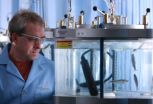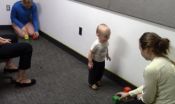(Press-News.org) PHILADELPHIA—Playing an active role in their radiation treatment decisions leaves cancer patients feeling more satisfied with their care, and may even relieve psychological distress around the experience, researchers from the Perelman School of Medicine at the University of Pennsylvania report in the journal Cancer.
In a study of 305 patients undergoing radiation treatment, Neha Vapiwala, MD, an associate professor in the department in Radiation Oncology at Penn Medicine, and colleagues at link "Penn's...Center: Penn's Abramson Cancer Center found an association between patient satisfaction and patient-perceived control and shared decision making (SDM)—the process that allows patients and providers to make health care decisions together, taking into account scientific evidence as well as the patient's values and preferences.
Patients who experienced SDM or perceived some control over their treatments were more satisfied with their care than those who did not experience SDM or perception of control—a difference of almost 17 percent and 26 percent, respectively. Furthermore, increased anxiety, depression and fatigue were reported in patients who desired control over treatments but did not perceive this control.
"Most importantly, our findings emphasize the value of patient-physician relationships and communication specifically in radiation oncology, and their impact on patient experience in a way that hasn't been shown before," said Dr. Vapiwala. "No matter where cancer patients are in the treatment process, there is always an opportunity to improve patient satisfaction—something hospitals and providers have consciously and increasingly been making a priority."
Past studies of SDM in patients undergoing chemotherapy, as well as treatments for other medical conditions such as hypertension and diabetes, have shown an association with improved satisfaction and quality of life. Taking notice, the Institute of Medicine recently recognized its importance, and the Affordable Care Act even devotes an entire section to establishing a program for SDM. However, no group has evaluated its impact on patients going through radiation.
Often, radiation oncology is seen as a treatment avenue that is ultimately left to the physician to dictate. But there are tailored options, decisions, and discussions that can apply to individual patients, even if they all have similar diagnoses. There are different radiation regimens, dosages, risks and benefits, as well as pain control management issues, that should be part of the ongoing conversation.
Among the participants in the study, 31 percent of patients experienced SDM, 32 percent perceived control in decisions, and 76 percent reported feeling very satisfied with their radiation treatment course overall. There was a significant association noted between patient satisfaction with his/her radiation treatments and patient-perceived experience of SDM (84.4 percent vs. 71.4 percent) or perceived control over one's treatment (89.7 percent vs. 69.2 percent).
Patients who specifically desired control over their treatment decisions, but did not perceive this control, experienced significantly more anxiety (44 percent vs. 20 percent), depression (44 percent vs. 15 percent), and fatigue (68 percent vs. 39.2 percent), compared with patients who did not perceive a sense of control in their treatment decisions.
One of the strengths of the study is its diverse group of patients. Ages ranged from 18 to 87 years old, with patients of varying ethnic and racial backgrounds, and having various cancers at all stages, as long as they were well enough to participate in the study.
The next step in the research is to determine both physician and patient barriers to SDM and to determine methods to break down these barriers.
"As providers, it doesn't matter what treatment you are offering, or how complicated it is, or how busy you may be," said Dr. Vapiwala. "It's worth taking even a few minutes to talk to patients about seemingly minor decisions in which they can provide some input. It's not only critical in today's health care setting where both information and misinformation are rampant, but will very likely lead to the patient feeling positively about the encounter."
INFORMATION:
Co-authors of the study—which was funded in part by the Penn Integrative Oncology Fund—include Jacob E. Shabason, MD, Jun J. Mao, MD, MSCE, and Eitan S. Frankel.
Shared decision making during radiation therapy improves patient satisfaction
Penn Medicine first to investigate shared decision making in radiation oncology
2014-04-14
ELSE PRESS RELEASES FROM THIS DATE:
Plague alters cell death to kill host
2014-04-14
Northwestern Medicine scientists are continuing to unravel the molecular changes that underlie one of the world's deadliest and most infamous respiratory infections.
When the bacterium Yersinia pestis enters the lungs, it causes pneumonic plague, a disease that is 100 percent fatal if untreated. The way in which Y. pestis evades the immune system and kills people in a matter of days has largely confounded scientists, until now.
Following a 2007 study demonstrating that the presence of a protein called the plasminogen activator protease (Pla) is required for Y. pestis ...
Climate change a likely culprit in coqui frog's altered calls, say UCLA biologists
2014-04-14
Changes in the Puerto Rican climate over the past three decades have caused small but significant changes to the coqui frog, the territory's national animal. UCLA biologists have found that not only have male coquis become smaller, but their mating call has also become shorter and higher pitched.
Authored by Peter Narins, UCLA distinguished professor of integrative biology and physiology and of ecology and evolutionary biology, and Sebastiaan Meenderink, a UCLA physics researcher, the study examined 170 male coqui frogs (Eleutherodactylus coqui) in 1983 and then 116 ...
Making dams safer for fish around the world
2014-04-14
RICHLAND, Wash. – Think of the pressure change you feel when an elevator zips you up multiple floors in a tall building. Imagine how you'd feel if that elevator carried you all the way up to the top of Mt. Everest – in the blink of an eye.
That's similar to what many fish experience when they travel through the turbulent waters near a dam. For some, the change in pressure is simply too big, too fast, and they die or are seriously injured.
In an article in the March issue of the journal Fisheries, ecologists from the Department of Energy's Pacific Northwest National ...
Cosmic slurp
2014-04-14
Somewhere in the cosmos an ordinary galaxy spins, seemingly at slumber. Then all of a sudden, WHAM! A flash of light explodes from the galaxy's center. A star orbiting too close to the event horizon of the galaxy's central supermassive black hole is torn apart by the force of gravity, heating up its gas and sending out a beacon to the far reaches of the universe.
In a universe with tens of billions of galaxies, how would we see it? What would such a beacon look like? How would we distinguish it from other bright, monumental intergalactic events, like supernovas?
"Black ...
Researchers identify children with emotional behavior difficulties
2014-04-14
Research on children orphaned by HIV/AIDS in South Africa may provide insight on how to identify and help children with emotional behavior issues in other areas of the world, which may have limited access to healthcare and further research that could lead to successful interventions.
A report on the global AIDS epidemic published by the United Nations mentions that due to the HIV/AIDS pandemic, which has left 12 million children orphaned in Sub-Saharan African, children are at an increased risk for mental health problems.
"There has been a big push to understand what ...
Henry Ford Hospital hits new heart valve surgery milestone
2014-04-14
DETROIT – Doctors at Henry Ford Hospital reached a medical milestone April 3, performing the 25th successful transcatheter valve replacement using a novel way to access the heart.
Henry Ford is the only hospital in the United States performing the unique procedure called transcaval valve replacement, which accesses the heart by temporarily connecting major blood vessels.
Northern Michigan resident Viola Waller, 80, underwent Henry Ford's first transcaval procedure on July 3, 2013 when traditional valve replacement was not medically viable.
"Nobody could help me here," ...
Dog ownership benefits families of children with autism, MU researcher finds
2014-04-14
COLUMBIA, Mo. –Many families face the decision of whether to get a dog. For families of children with autism, the decision can be even more challenging. Now, a University of Missouri researcher has studied dog ownership decisions in families of children with autism and found, regardless of whether they owned dogs, the parents reported the benefits of dog ownership included companionship, stress relief and opportunities for their children to learn responsibility.
"Children with autism spectrum disorders often struggle with interacting with others, which can make it difficult ...
Rare bone diseases and their dental, oral and craniofacial manifestations
2014-04-14
Alexandria, Va., USA – The International and American Associations for Dental Research (IADR/AADR) have published a paper titled "Rare Bone Diseases and Their Dental, Oral, and Craniofacial Manifestations." The complete review by researchers Sunday O. Akintoye, Andrea B. Burke, Alison M. Boyce, Michael Collins, Brian L. Foster, Rachel I. Gafni, Janice S. Lee, Mary Scott Ramnitz, Martha J. Somerman and J. Timothy Wright is published in the OnlineFirst portion of the IADR/AADR Journal of Dental Research (JDR).
Hereditary diseases affecting the skeleton are heterogeneous ...
Researchers describe 4 new species of 'killer sponges' from the deep sea
2014-04-14
MOSS LANDING, CA — Killer sponges sound like creatures from a B-grade horror movie. In fact, they thrive in the lightless depths of the deep sea. Scientists first discovered that some sponges are carnivorous about 20 years ago. Since then only seven carnivorous species have been found in all of the northeastern Pacific. A new paper authored by MBARI marine biologist Lonny Lundsten and two Canadian researchers describes four new species of carnivorous sponges living on the deep seafloor, from the Pacific Northwest to Baja California.
A far cry from your basic kitchen sponge, ...
Babies prefer fairness -- but only if it benefits them -- in choosing a playmate
2014-04-14
A couple of years ago a University of Washington researcher who studies how children develop social behaviors like kindness and generosity noticed something odd. The 15-month-old infants in her experiments seemed to be playing favorites among the researchers on her team, being more inclined to share toys or play with some researchers than others.
"It's not like one experimenter was nicer or friendlier to the babies – we control for factors like that," said Jessica Sommerville, a UW associate professor of psychology. She took a closer look at the data and realized that ...
LAST 30 PRESS RELEASES:
Prevalence of over-the-counter and prescription medication use in the US
US child mental health care need, unmet needs, and difficulty accessing services
Incidental rotator cuff abnormalities on magnetic resonance imaging
Sensing local fibers in pancreatic tumors, cancer cells ‘choose’ to either grow or tolerate treatment
Barriers to mental health care leave many children behind, new data cautions
Cancer and inflammation: immunologic interplay, translational advances, and clinical strategies
Bioactive polyphenolic compounds and in vitro anti-degenerative property-based pharmacological propensities of some promising germplasms of Amaranthus hypochondriacus L.
AI-powered companionship: PolyU interfaculty scholar harnesses music and empathetic speech in robots to combat loneliness
Antarctica sits above Earth’s strongest “gravity hole.” Now we know how it got that way
Haircare products made with botanicals protects strands, adds shine
Enhanced pulmonary nodule detection and classification using artificial intelligence on LIDC-IDRI data
Using NBA, study finds that pay differences among top performers can erode cooperation
Korea University, Stanford University, and IESGA launch Water Sustainability Index to combat ESG greenwashing
Molecular glue discovery: large scale instead of lucky strike
Insulin resistance predictor highlights cancer connection
Explaining next-generation solar cells
Slippery ions create a smoother path to blue energy
Magnetic resonance imaging opens the door to better treatments for underdiagnosed atypical Parkinsonisms
National poll finds gaps in community preparedness for teen cardiac emergencies
One strategy to block both drug-resistant bacteria and influenza: new broad-spectrum infection prevention approach validated
Survey: 3 in 4 skip physical therapy homework, stunting progress
College students who spend hours on social media are more likely to be lonely – national US study
Evidence behind intermittent fasting for weight loss fails to match hype
How AI tools like DeepSeek are transforming emotional and mental health care of Chinese youth
Study finds link between sugary drinks and anxiety in young people
Scientists show how to predict world’s deadly scorpion hotspots
ASU researchers to lead AAAS panel on water insecurity in the United States
ASU professor Anne Stone to present at AAAS Conference in Phoenix on ancient origins of modern disease
Proposals for exploring viruses and skin as the next experimental quantum frontiers share US$30,000 science award
ASU researchers showcase scalable tech solutions for older adults living alone with cognitive decline at AAAS 2026
[Press-News.org] Shared decision making during radiation therapy improves patient satisfactionPenn Medicine first to investigate shared decision making in radiation oncology







